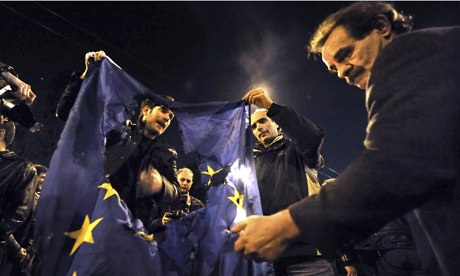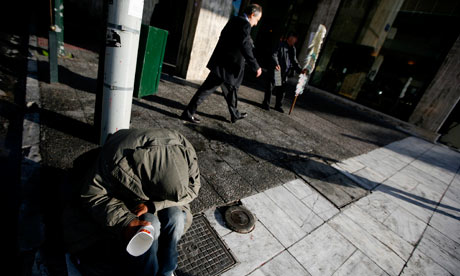Greece bailout: MEPs land in Athens to investigate effect of troika's loans
Inquiry comes amid mounting criticism of the wreckage austerity has left since Greece accepted emergency loans

Greek demonstrators
burn an EU flag in Athens in 2010 to protest at imposed austerity
measures. Photograph: Louisa Gouliamaki/AFP/Getty Images
An inquiry into whether international creditors have inflicted more harm than good on Greece – the most problematic of the four countries bailed out since the onset of Europe's debt crisis – intensified on Wednesday with the arrival in Athens of MEPs conducting the investigation.
In a reversal of roles, the seven-strong team of MEPs began an on-the-ground examination of the tough cost-cutting policies that Athens' "troika" of lenders – the EU, European Central Bank and International Monetry Fund – has prescribed as a cure for the nation's financial woes.
The two-day visit comes amid mounting criticism of the wreckage austerity has left in its wake since Greece, locked out of capital markets, was forced to resort to emergency loans to avert default.
Ottmar Karas, the conservative Austrian European Parliament vice-president leading the inquiry, admitted mistakes had been made. "The troika … prevented the bankruptcy of several countries. Without it, the situation today would be much worse," he told the Greek daily Kathimerini ahead of the fact-finding mission.
"But that does not mean that every single decision and the decision procedures have been perfect … nobody, no country, no institution was prepared for such a situation."
The adjustment programme enforced on Greece as the price of more than €240bn in aid has been blamed for record levels of unemployment, the loss of more than a quarter of GDP, prolonged recession and a sharp increase in the country's already monumental debt load, even though it has also achieved the biggest fiscal consolidation in modern times.
 A homeless man begs for money in Athens. Photograph: Alkis Konstantinidis/EPA
According to figures released by the European Parliament, Greek
public debt jumped from 148 % of national output in 2010, when Athens
signed up to the international rescue, to more than 176% of GDP at the
end of 2013. Under the twice-bailed out nation's latest loan agreement,
it will need to fall to around 120% by 2020 to become anywhere near
sustainable – a target widely seen as high nigh impossible.
A homeless man begs for money in Athens. Photograph: Alkis Konstantinidis/EPA
According to figures released by the European Parliament, Greek
public debt jumped from 148 % of national output in 2010, when Athens
signed up to the international rescue, to more than 176% of GDP at the
end of 2013. Under the twice-bailed out nation's latest loan agreement,
it will need to fall to around 120% by 2020 to become anywhere near
sustainable – a target widely seen as high nigh impossible.
But likening the crisis to a storm, Karas insisted that Greece, Ireland, Spain, Portugal and Cyprus had ultimately been saved. "We had to repair the boat during the storm," he said. "The storm is not yet over. But we have saved the boat – that is what everybody has to acknowledge. But now we have to ask what can be done in a better way, in similar situations in the future."
The delegation, which has visited Ireland, Portugal and Cyprus, will be meeting officials from the Greek government and anti-austerity opposition for a report it is expected to publish in April.
The team has already indicated that the troika may become a thing of the past as it looks at ways of reorganising the body.
The IMF has increasingly been at loggerheads with other lenders over rescue policies, not least those imposed on Greece where it insists that debt relief must now be made a priority if the crisis-plagued country is ever to recover economically.
Germany – the biggest provider of assistance so far, bankrolling around 27% of the emergency loans to date – has fiercely rejected the proposal, arguing that fiscal progress will be only be improved when Athens forges ahead with long overdue structural reforms and the sale of state assets. Creditors promised to discuss the possibility of a debt write-down when Greece achieved a primary budget surplus which it is on course to do.
Karas conceded that as part of the soul-searching the creation of a European Monetary Fund – carved out of the emergency European stability mechanism – was among the options now being considered. "The help of the IMF was indispensable. At the beginning of the crisis, the EU did not have the expertise the IMF had," he said, referring to the Washington-based organisation's long history of overseeing financial assistance programmes for ailing states.
"But it is also true that the share of IMF money in the [European] programmes [has] decreased from a third at the beginning to less than 10% now."
In a reversal of roles, the seven-strong team of MEPs began an on-the-ground examination of the tough cost-cutting policies that Athens' "troika" of lenders – the EU, European Central Bank and International Monetry Fund – has prescribed as a cure for the nation's financial woes.
The two-day visit comes amid mounting criticism of the wreckage austerity has left in its wake since Greece, locked out of capital markets, was forced to resort to emergency loans to avert default.
Ottmar Karas, the conservative Austrian European Parliament vice-president leading the inquiry, admitted mistakes had been made. "The troika … prevented the bankruptcy of several countries. Without it, the situation today would be much worse," he told the Greek daily Kathimerini ahead of the fact-finding mission.
"But that does not mean that every single decision and the decision procedures have been perfect … nobody, no country, no institution was prepared for such a situation."
The adjustment programme enforced on Greece as the price of more than €240bn in aid has been blamed for record levels of unemployment, the loss of more than a quarter of GDP, prolonged recession and a sharp increase in the country's already monumental debt load, even though it has also achieved the biggest fiscal consolidation in modern times.
 A homeless man begs for money in Athens. Photograph: Alkis Konstantinidis/EPA
According to figures released by the European Parliament, Greek
public debt jumped from 148 % of national output in 2010, when Athens
signed up to the international rescue, to more than 176% of GDP at the
end of 2013. Under the twice-bailed out nation's latest loan agreement,
it will need to fall to around 120% by 2020 to become anywhere near
sustainable – a target widely seen as high nigh impossible.
A homeless man begs for money in Athens. Photograph: Alkis Konstantinidis/EPA
According to figures released by the European Parliament, Greek
public debt jumped from 148 % of national output in 2010, when Athens
signed up to the international rescue, to more than 176% of GDP at the
end of 2013. Under the twice-bailed out nation's latest loan agreement,
it will need to fall to around 120% by 2020 to become anywhere near
sustainable – a target widely seen as high nigh impossible.But likening the crisis to a storm, Karas insisted that Greece, Ireland, Spain, Portugal and Cyprus had ultimately been saved. "We had to repair the boat during the storm," he said. "The storm is not yet over. But we have saved the boat – that is what everybody has to acknowledge. But now we have to ask what can be done in a better way, in similar situations in the future."
The delegation, which has visited Ireland, Portugal and Cyprus, will be meeting officials from the Greek government and anti-austerity opposition for a report it is expected to publish in April.
The team has already indicated that the troika may become a thing of the past as it looks at ways of reorganising the body.
The IMF has increasingly been at loggerheads with other lenders over rescue policies, not least those imposed on Greece where it insists that debt relief must now be made a priority if the crisis-plagued country is ever to recover economically.
Germany – the biggest provider of assistance so far, bankrolling around 27% of the emergency loans to date – has fiercely rejected the proposal, arguing that fiscal progress will be only be improved when Athens forges ahead with long overdue structural reforms and the sale of state assets. Creditors promised to discuss the possibility of a debt write-down when Greece achieved a primary budget surplus which it is on course to do.
Karas conceded that as part of the soul-searching the creation of a European Monetary Fund – carved out of the emergency European stability mechanism – was among the options now being considered. "The help of the IMF was indispensable. At the beginning of the crisis, the EU did not have the expertise the IMF had," he said, referring to the Washington-based organisation's long history of overseeing financial assistance programmes for ailing states.
"But it is also true that the share of IMF money in the [European] programmes [has] decreased from a third at the beginning to less than 10% now."
No comments:
Post a Comment